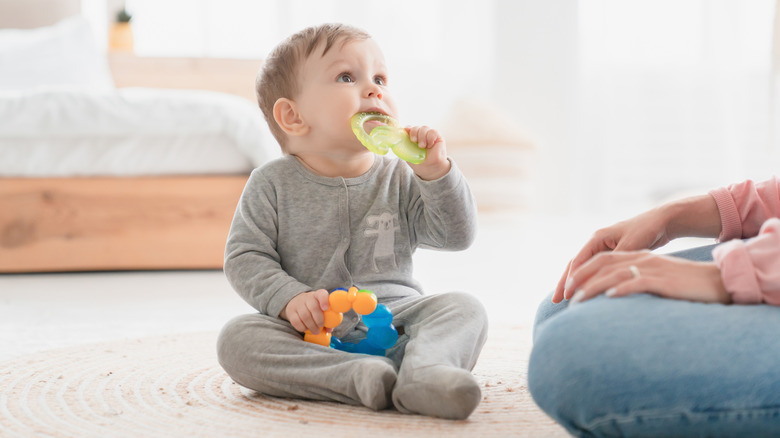Does Teething Cause A Fever?
Teething is no fun for anyone, babies and caregivers alike. The tears and crankiness can seem to go on forever. There are lots of classic teething symptoms, like drooling and fussiness, but what about fevers?
Infants typically start teething around 6 months old, according to the Mayo Clinic. Usually, the two front bottom teeth appear first, and then the two front top teeth. A "tooth eruption," or development of a new tooth, can last around eight days (via BMC Oral Health). Signs and symptoms of teething for infants can include grumpiness, sleep disturbance, more crying than usual, excessive drooling, pulling on their ears, putting their hands and objects in their mouth, and changes in appetite (per WebMD). A 2015 study of 270 infants and toddlers published in BMC Oral Health found that more symptoms may occur in children with low birth weights. Another symptom of teething in infants is a slightly raised temperature — but not a fever.
A fever is a sign of something more
Contrary to popular belief, fever is a false symptom of teething, according to Seattle Children's Hospital. According to the study published in BMC Oral Health, there was no correlation found between teething and fever (or diarrhea, either). It's normal for a child's temperature to rise slightly while working on a new tooth; however, a temperature that reaches above 100.4 degrees Fahrenheit (38.0 degrees Celsius), could be a sign that something is wrong and unrelated to teething (via WebMD).
It makes sense that infants can start getting sick more often, and subsequently more fevers, around this age as well. First, antibodies acquired from the mother at birth begin to wear off between 6 and 12 months old, leaving babies more susceptible to illness. Second, it's developmentally appropriate for babies to begin to put everything in their mouths at this age, exposing them to new germs and bacteria (via Seattle Children's Hospital).
The signs of sickness and teething can be similar, though — irritability, trouble eating, and sleep disruption to name a few. It's important to pay close attention to temperature, as a fever could be a sign of a more serious infection or virus.

